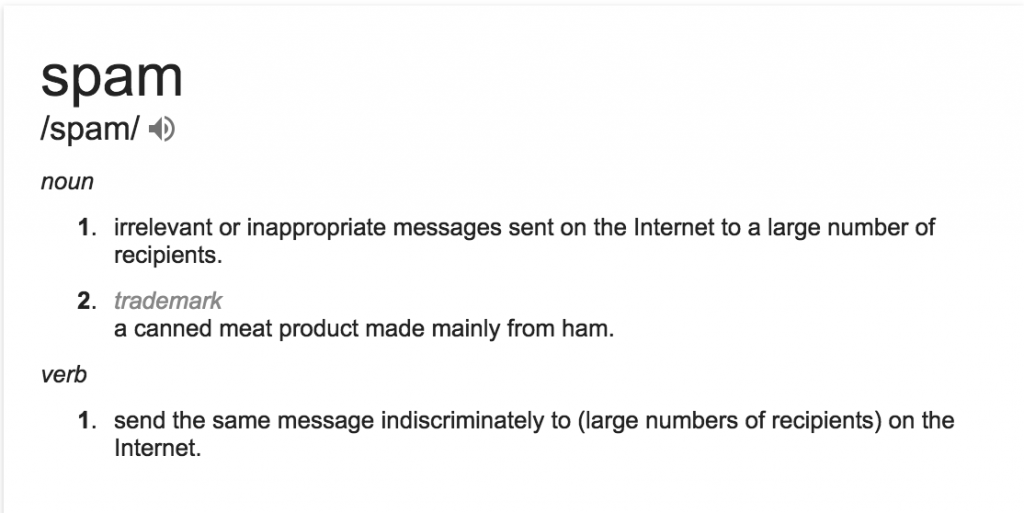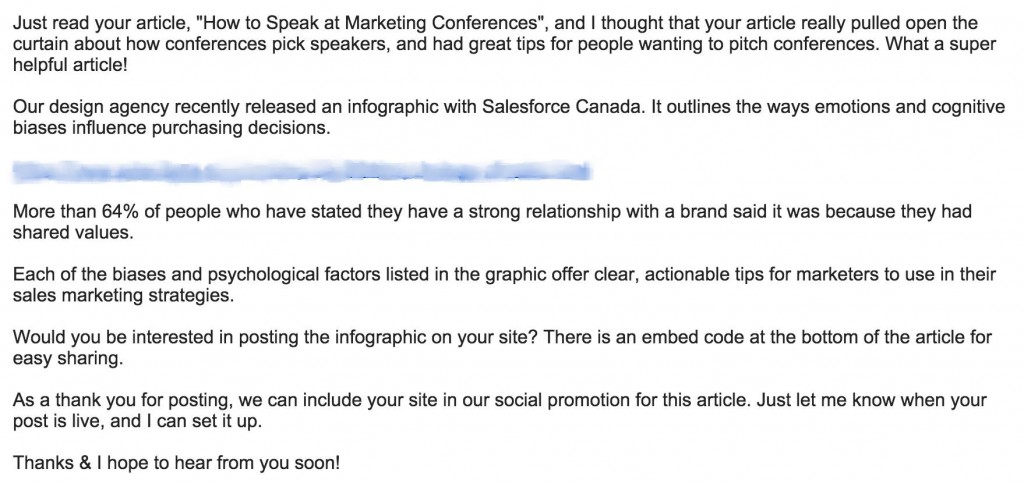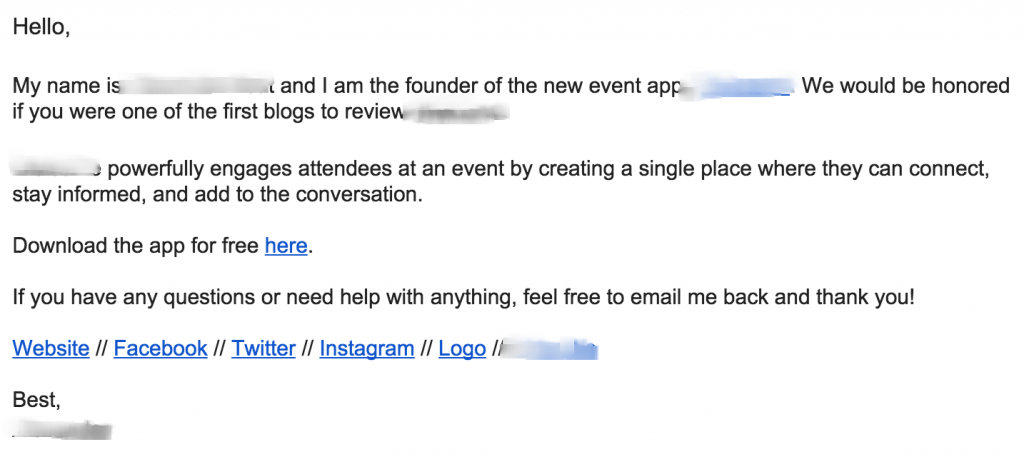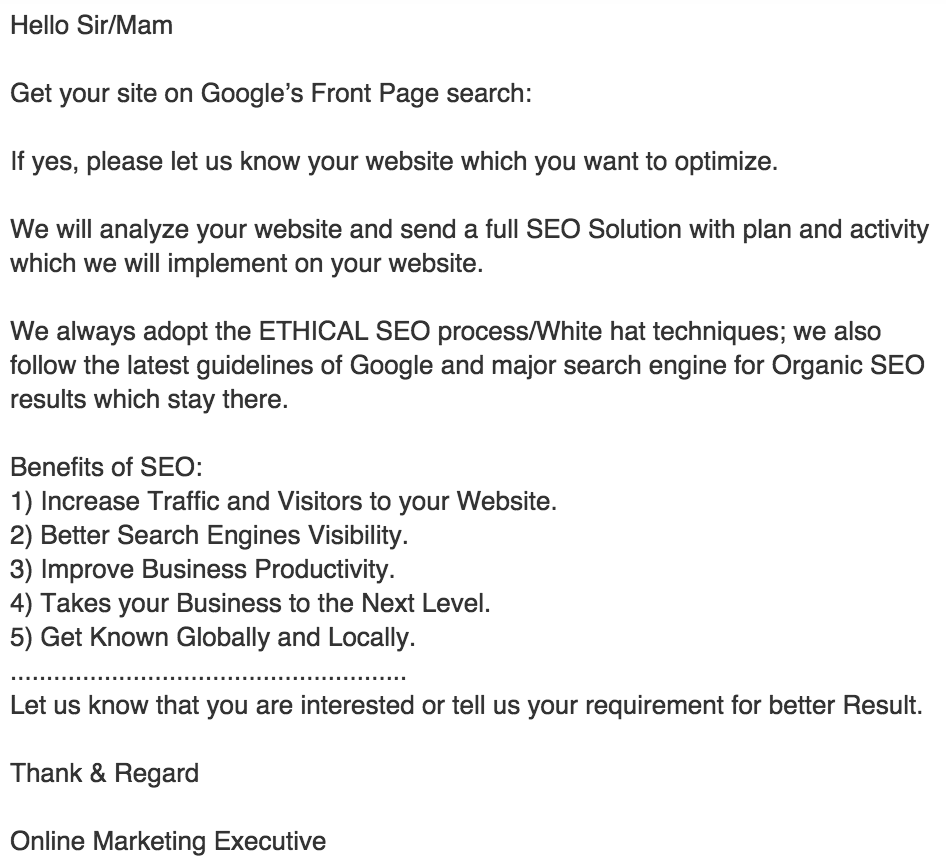I’m getting tired of spam e-mails and bad pitches.
So, I was inspired by a recent blog post by Geraldine DeRuiter, otherwise known as the Everywhereist, in which she hilariously replies to every single spam message that she had received over a certain period of time. If you are a PR or communications professional who pitches or an influencer or reporter who gets pitched, you need to read it. Right now. I’ll be here when you return.
Now, why is her essay important? Because bad PR pitches are little more than spam by another name. Here’s Google’s answer box when I search for “definition of spam“:
Spam, in part, has the following attributes:
- Irrelevent messages
- Messages sent to large numbers of people
- Messages sent indiscriminately
The same three things apply to most bad PR pitches. If you pitch me without bothering to research what I write and what specifically interests me, then you are probably sending me messages that are irrelevant. If my e-mail address is just one of many that are in the BCC fields of an e-mail or an a gigantic list within e-mail software, then you are sending messages to large numbers of people. If you are pitching me (and others) only because you think that I’m some important influencer or writer or something, then you are sending messages indiscriminately.
(I’d also add that both spam and bad PR pitches are often — but not always — unsolicited attempts to sell something.)
Following my inspiration from DeRuiter, here are some recent examples of bad sales and pitch e-mails that I have received — along with comments that I hope are not too negative. (Hey, I hate spam as much as the next person — and probably more because a lot of my work is based on the Internet.) Names and companies have been removed because they have already suffered enough.
I’ll make “Strikeout Pitches” a regular, ongoing feature with my real-life examples of how not to send sales and PR pitches.
The formula is obvious: Give the person a compliment to butter him or her up, and then sell something. But the first and second paragraphs are missing something that we in writing call a transition sentence. Those two paragraphs are awkward, disjointed, and have nothing to do with each other. It’s likely a copy-and-paste e-mail template in which some compliment is written in the opening and then the rest is just pasted into the message. Bad.
I looked up the person who sent the e-mail, and she was a “content marketer” works for a very well-known agency that everyone in the SEO world would recognize. But this is really just a “content marketer” trying to impersonate a PR person (and doing it badly). If you’re actually doing PR — by whatever name you chose to call it — then hire a PR professional or agency.
But at least the person made an attempt to personalize the pitch.
It was obvious in two seconds that this person knew nothing about me. A few minutes of research on my marketing essays here, my contributed articles for Moz, and my SEO and Internet marketing speaking engagements would reveal that I never reply to e-mails like these.
I hate traditional linkbuilding. In fact, I’ve been on a personal vendetta against the practice because I hate how it reflects on the digital marketing industry and indirectly on myself. If you first start talking about links and PageRank and Domain Authority, I will ignore you. (Don’t people know that PageRank has become meaningless and useless?)
Bad grammar and spelling is the #1 sign that you are a spammer. Look, I’m sympathetic. I was born and raised in the United States and now live in Israel. Even though Hebrew is my second language, I almost always speak and write in English in professional contexts. I’m not 100% fluent in Hebrew, so any speaking and writing mistakes subconsciously make me look bad to those with whom I’m communicating. Write pitches in your native language — or at least get someone who is a native speaker to check your pitches.
Of course, these two principles likely did not matter to the person who sent me the e-mail — the pitches are likely sent en masse to an entire list. And that makes them spam.
Oh, and I will never open an attachment from someone who I don’t know.
That person was way too optimistic.
What is “press release marketing”? I don’t even know what that means.
I posted this pitch on my Facebook profile and tagged the company to see if they would comment. They responded to say that “press release marketing” is the inclusion of items including social media and multimedia within press releases.
Sure, those items can help to inform and convince reporters and bloggers to cover you, but in the end it is merely using additional tactics to do PR and publicity — it is not “press release marketing.”
You really analyzed the business vertical of Logz.io, the log analytics software company for whom I’m Director of Marcom? Bullcrap. If so, then cite one or two specific examples of analysis on how my specific company can use your product.
This person probably did not take one look at my blog (or the places where I contribute). I don’t review apps. Tell me, spammer, how is this relevant to me?
“Hello Sir/Mam?” Hello Sir/Mam?
And if your opening line is about how to get to the top of Google, then you are the reason that I no longer say that I work in “SEO.” If you do good web development, marketing, and PR, then you’ll climb to the top of Google as a by-product of doing those three things well and building a brand that deserves to rank highly. “SEO,” thankfully, is no longer a bag of tricks to get to #1 in Google.
Thank & Regard
Online Marketing Executive
No. Just, no.
Good Pitches to Send
Of course, it’s easy to criticize. The correct answer to this blog post is to ask, “Well, how SHOULD people pitch?” In response, I recommend reading my Moz essay on public relations 101, seeing specific pitching examples in my post there on integrating SEO and PR (which was inspired by my webinar last year), and looking at my essay here on pitching reporters in different industries.
If you’re going to spam by sending bad PR pitches and sales e-mails, it’s best not to send anything at all.
For more similar reflections on pitching, I recommend reading Blonde 2.0’s “How to Pitch Me” series and articles like this one by Patrick Coffee in the “Pitch, Please” series at PR Newser on AdWeek.








